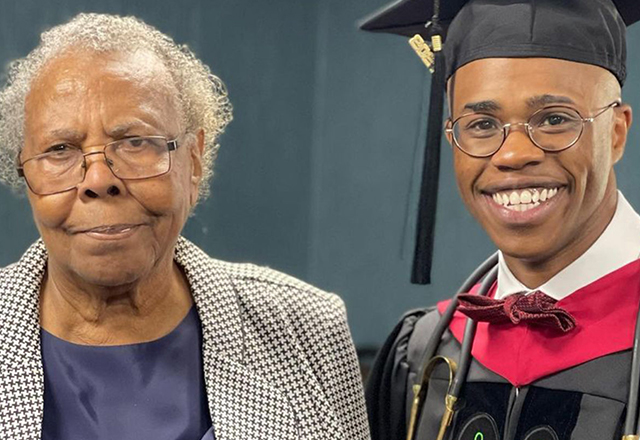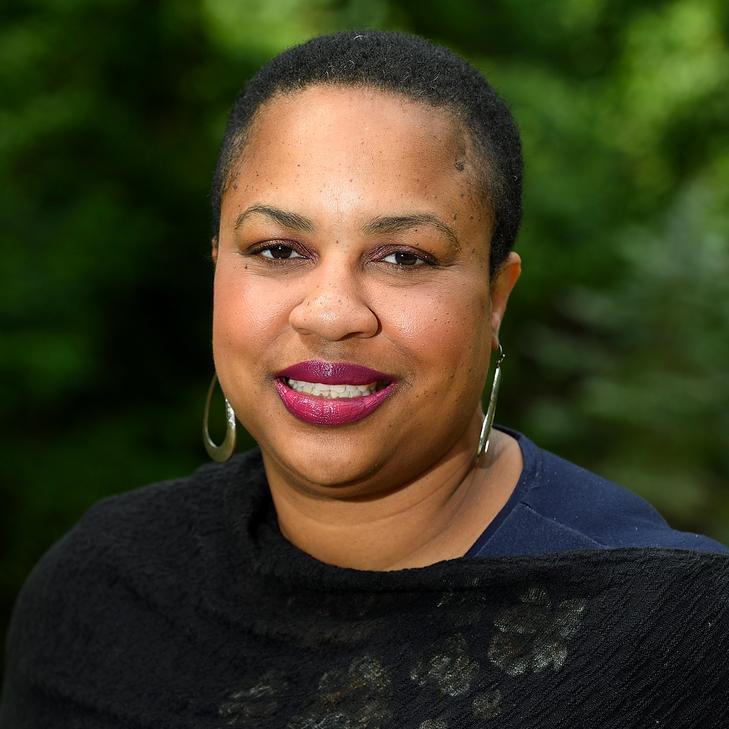Johns Hopkins Doctor Walks Same Hospital Floors His Grandmother Cleaned 70 Years Ago
Growing up in a multigenerational family in Richmond, Virginia, Johns Hopkins emergency medicine resident Nelson Malone knew that his grandparents, like many others in his community, struggled to make ends meet. However, it wasn’t until 2021, while working on his master’s degree in public health at Johns Hopkins, that he learned his late grandmother, Marion Malone, generated additional income for the family in the 1950s by cleaning floors and patient rooms at The Johns Hopkins Hospital.
Now Malone thinks about her every day, as he traverses those same corridors to treat patients in the emergency department. He also remembers her as he interacts with people from all walks of life. “It’s so rewarding to be able to help people in critical moments related to their physical and mental health, housing insecurity and other issues of well-being,” he says.
Although Marion Malone died in January 2022, she was able to attend her grandson’s graduation from Harvard Medical School in 2021.

The Path to Medicine and Racial Justice Advocacy
From the outset of his career, Malone advocated for people of color and minorities in medicine. Having earned his bachelor’s degree at Howard University as a first-generation student, he developed a passion to address inequities in health and health care. Continuing his studies at Harvard Medical School, he served as the chapter president of the Student National Medical Association and co-founder/co-chair of the Harvard Medical School/Harvard School of Dental Medicine Racial Justice Coalition. He received the 2020–21 Harvard Medical School Presidential Scholars Public Service Award.
Malone also completed a master’s degree from the Johns Hopkins Bloomberg School of Public Health. As a Sommer Scholar, he focused on biostatistics/epidemiology, leadership and health policy. He was also part of the inaugural Johns Hopkins Health Policy Institute, serving as legislative intern to Maryland State Senator Antonio Hayes, during the 2020 Maryland General Assembly.
He’s active in Black Men in White Coats, an organization that addresses systemic barriers preventing Black men from becoming physicians. According to the organization’s surveys, fewer Black men applied to medical school in 2014 than in 1978. Only 2% of American doctors are Black men, a number a number Malone hopes will increase.
As an emergency medicine doctor, Malone responds to conditions including traumas, strokes, heart attacks, seizures and psychiatric illnesses. He says he chose Johns Hopkins for his residency because of its “perfect combination of patient-centered care and academic rigor.”
Malone will participate in the 4th year Focused Advanced Specialty Training (FAST) program, which allows residents the time and flexibility to explore a niche. He is interested in the social emergency medicine track aimed at understanding and taking advantage of the emergency department as a critical connection with the community. The program also provides opportunities to participate in research about underserved patients in East Baltimore, in addition to supporting their health care needs.
An Institutional Imperative That Resonates
Efforts to raise awareness about discrimination and racial disparities are gaining traction, says Sherita Golden, Johns Hopkins Medicine’s vice president and chief diversity officer.
She points out that in 2019, only 14% of the incoming medical residents at Johns Hopkins Medicine were from underrepresented in medicine groups. By 2021, that number had climbed to 21%. “We should aim next for 30% and keep moving forward,” says Golden. “As we think about developing a diverse and inclusive biomedical workforce, we have to ask ourselves, ‘How can we innovate? What can we do to encourage students and trainees to come here?’”
Golden completed her internal medicine residency and endocrinology fellowship at Johns Hopkins, and serves as the Hugh P. McCormick Family Professor of Endocrinology and Metabolism at the school of medicine. She says every effort to attract those underrepresented in health care to work at Johns Hopkins Medicine is significant.
She notes that over the past two years, at least 30 executive-level (director and above) positions have been filled by people from underrepresented groups. “We’ve also regained more trust in the community because we’ve been able to provide COVID-19 vaccines in community settings, with support from a Health Services Cost Review Commission grant, among other things,” she says. “In addition, mobile vans have encouraged greater interaction between the health system and the community.”
Are you part of a multigenerational family who has worked at Johns Hopkins Medicine? If so, please share your story by contacting Judy Minkove, at [email protected].



